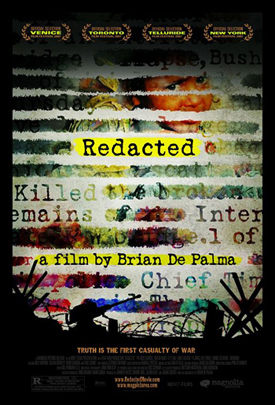
 You’ve probably heard wrong information about Redacted, so let’s do some bookkeeping. Yes, it’s Brian De Palma’s recreation of the rape and murder of a 15-year old Iraqi girl and the murder of her family. No, it is not made from documentary footage and other sources. It is one hundred percent dramatized.
You’ve probably heard wrong information about Redacted, so let’s do some bookkeeping. Yes, it’s Brian De Palma’s recreation of the rape and murder of a 15-year old Iraqi girl and the murder of her family. No, it is not made from documentary footage and other sources. It is one hundred percent dramatized.
De Palma has made a film that resembles post-modern novels; less Pale Fire and more House of Leaves. Footage is intended to look like it was created by soldiers, found on YouTube and extremist Islamic blogs, and captured by security cameras.
So choose the question you want to ask about Redacted. Is De Palma justified making his second document about a rape perpetrated by US soldiers? Does his love of aesthetics overwhelm and distract from the story? Does this narrative experiment offer any objective truth or is it merely an emotional towline for viewers whose anti-war stance is already confirmed?
Before I get to any of those, I want to condense the conversation I’ve had with quite a few people. I liked the film, though ‘like’ might be the wrong word. I was with it while it ran, and felt the horror and outrage I believe De Palma intended me to feel, while asking some questions I don’t think he wanted me to focus on, about theme and delivery.
Though I stand as one of the (relatively few) people at TIFF who reacted positively, over the course of discussion I end up either acknowledging or pointing out so many flaws that I have to question why I’m on this side of the fence. The acting is often poor. De Palma’s love of aesthetics does indeed overwhelm what he’s trying to do. And he’s inconsistent thematically, with the idea of information being stripped away and held hostage touched all too briefly.
I don’t know why actors were chosen over non-actors, but I believe it was a mistake. I’m sure De Palma wanted a crew of unknowns, but these actors pretending to be non-actors (a different sort of performance from simply acting, and evidently much more difficult) works only half the time. Izzy Diaz is weak but acceptable as Angel Salazar, the private who’s filming his Iraq deployment to get into film school. Ty Jones is great as the squad’s master sergeant, walking the sands like he’s in Full Metal Jacket.
(EDIT: I’d placed a spoiler here but can’t get the swipe to work. When I do, it’ll be back.)
Two key American actors are weak. Patrick Carroll as the amoral redneck Reno Flake and Daniel Stewart Sherman as Flake’s dimwitted brother in arms. Both play redneck soldiers like people who’ve never been outside New York or LA, and they support significantly allegations that the film is merely pushing buttons. They are rarely nuanced or credible in the least.
Making their work more difficult is De Palma’s camera. He’s shooting in HD, but doesn’t degrade or affect his footage enough so that it conforms to what we’re told it is. So the YouTube and webcam clips look far too glossy, and several scenes caught by a surveillance camera appear wholly stagebound, implying that Redacted is deliberately removed from reality. I’m moved and frightened by the execution of a soldier on an Islamic website, but also set off by how shiny it looked.
Granted, the images are often beautiful. De Palma begins by poking fun at French and American approaches to documentary. Footage shot by Salazar is raw and almost mindless. He thinks truth is revealed just by pointing his camera. That’s cut against a stereotypical French documentary, resplendent with sunsets, woodwinds and serious narration. But that material eventually fades out, and while all the other footage in the film is clearly shot by someone in the cast, the French doc is a mystery. A good gag, sure, but where did it come from?
Furthermore, where did the title theme go? You’ll ruefully laugh at the opening text, which is slowly redacted into nothingness, and you should cringe at the Army’s unwillingness to prosecute perpetrators of the film’s terrible crime. The dream of speaking truth to power is present, at least, in the irrepressible ways that digital media always finds a home. But this attack on the information status quo might be more powerful if it was less linear and if we saw documents actually disappearing instead of being denied.
Even so, Redacted is powerful and heartfelt. Frame after frame is stocked with symbols, and an actor hewing to the Blue Collar Comedy school of acting before a rape doesn’t lessen the crime’s impact. De Palma’s intentions are on target, both from a narrative and structural perspective. But both approaches are also heavily flawed, and while I’m happy to defend the construction, I also feel true regret that there is more potential implied than promise delivered.